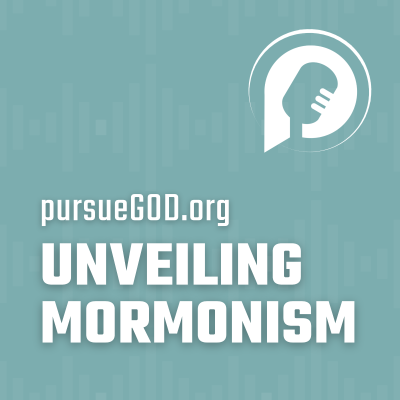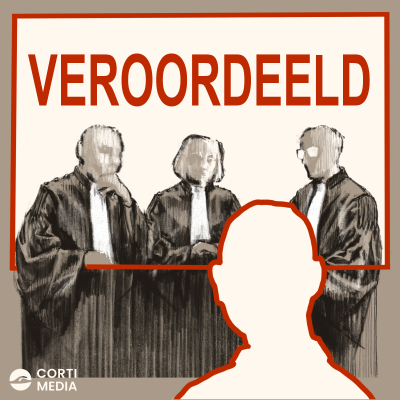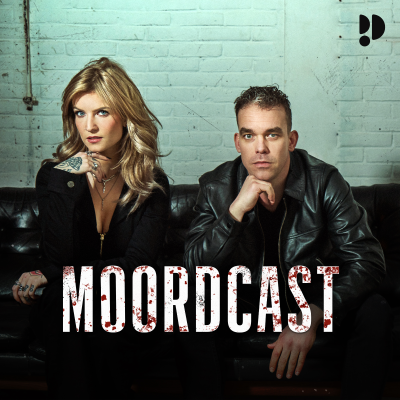
Unveiling Mormonism
Podcast door PursueGOD
Tijdelijke aanbieding
2 maanden voor € 1
Daarna € 9,99 / maandElk moment opzegbaar.

Meer dan 1 miljoen luisteraars
Je zult van Podimo houden en je bent niet de enige
Rated 4.7 in the App Store
Over Unveiling Mormonism
Join Ross Anderson and Bryan Dwyer, pastors with over 50 years of combined ministry experience in Utah, as they take a deep dive on everything Mormon – from theology to history to culture. New topic every Monday.
Alle afleveringen
171 afleveringenLayne, a former Mormon of 40 years, has a deep love for the LDS community and a heart to help them see how the Book of Mormon points to the biblical Jesus. -- The Unveiling Mormonism podcast pulls back the curtain on Mormon history, culture and doctrine. Join us for new episodes every Monday. Find resources to talk about these episodes at pursueGOD.org/mormonism [https://pursuegod.org/mormonism]. Help others go "full circle" as a follower of Jesus through our 12-week Pursuit series [https://www.pursuegod.org/pursuit-lds/]. Click here [https://www.pursuegod.org/about/] to learn more about how to use these resources at home, with a small group, or in a one-on-one discipleship relationship. Got questions or want to leave a note? Email us at podcast@pursueGOD.org. Donate Now [https://unveiling-mormonism.captivate.fm/donate] -- In this episode, Bryan sits down with Layne to explore his unique approach to sharing Jesus with Latter-day Saints—by starting with the Book of Mormon itself. Layne, a former Mormon of 40 years, has a deep love for the LDS community and a heart to help them see how the Book of Mormon points to the biblical Jesus. The conversation centers on 3 Nephi 11, where Jesus of the Book of Mormon lays out His doctrine: faith in Him, repentance, baptism, and receiving the Holy Spirit—warning not to add or take away from these essentials. Layne shares how these simple principles in the Book of Mormon contrast sharply with the later, expanded LDS requirements found in other scriptures and modern church teachings. Along the way, Layne reflects on: * Why the Book of Mormon sounds more like historic Christianity than modern Mormonism. * How LDS members are often conditioned to trust the prophet over their own study of scripture. * Why progressive revelation has allowed doctrines to shift far from the original text. * His own journey from “all-in Mormon” to “all-in for Jesus.” This is just the beginning of a multi-part series where Bryan and Layne will examine what the Book of Mormon says about the nature of God, Jesus, the Holy Spirit, and salvation—and compare it with both the Bible and current LDS teaching. Key Topics in This Episode: * Layne’s story and heart for the Mormon people. * Understanding the “testimony wall” and how to lower it. * Context of 3 Nephi 11 in LDS scripture. * Jesus’ four unchanging principles—and His warning about adding more. * The gap between the Book of Mormon and later LDS doctrines. Quote to Think About: “You don’t need a system—you need a Savior. Jesus already finished it fully and completely.”
The story of the missing 116 pages isn’t just an early Mormon mishap—it’s a revealing glimpse into how Joseph Smith used “divine revelation” to cover his tracks and shape a theology on the fly. -- The Unveiling Mormonism podcast pulls back the curtain on Mormon history, culture and doctrine. Join us for new episodes every Monday. Find resources to talk about these episodes at pursueGOD.org/mormonism [https://pursuegod.org/mormonism]. Help others go "full circle" as a follower of Jesus through our 12-week Pursuit series [https://www.pursuegod.org/pursuit-lds/]. Click here [https://www.pursuegod.org/about/] to learn more about how to use these resources at home, with a small group, or in a one-on-one discipleship relationship. Got questions or want to leave a note? Email us at podcast@pursueGOD.org. Donate Now [https://unveiling-mormonism.captivate.fm/donate] -- INTRODUCTION * One of the most embarrassing and revealing scandals in Mormon history is the story of the missing 116 pages of the original Book of Mormon manuscript. * This event not only highlights the human invention at the heart of Mormon origins but also shows how Joseph Smith used convenient “revelations” to cover his tracks. * Even South Park famously mocked this story—because it’s so unbelievable that even secular audiences can see through it. 1. THE STORY OF THE MISSING 116 PAGES * In 1828, Joseph Smith began dictating what he claimed was a divine translation of ancient golden plates, with Martin Harris as his scribe. * Harris, facing skepticism from his wife and others, begged to take the manuscript home to prove the work's authenticity. * Smith claimed to receive divine permission after initially being told “no” twice. * Harris lost the first 116 pages—they were never recovered. LDS Scripture: Doctrine & Covenants 3 (July 1828): * This is Joseph Smith’s first recorded revelation after the disaster. * It is a sharp rebuke from God, calling Joseph to repentance for his disobedience but also offering reassurance that the work would still move forward. * This marks the first time Smith claimed to receive a dictated revelation directly from God, setting a pattern for how Mormon “scripture” would develop. 2. WHY COULDN’T SMITH JUST RETRANSLATE? If Smith was truly translating by the gift and power of God, why not simply redo the translation? * If the translation was truly by “the gift and power of God,” shouldn’t it have produced the same result, word for word, no matter what? * Why would God, all-powerful and sovereign, allow a human scheme to thwart the process? * If the book was engraved on plates, why not simply translate them again as-is? Smith claimed that evil men would alter the original pages to expose him as a fraud if he attempted a retranslation. The supposed solution: God had prepared a backup record—the Small Plates of Nephi—which covered the same historical period but with a spiritual focus. LDS Scripture: Doctrine & Covenants 10 (Summer 1829): * Smith claimed God told him not to retranslate but to use the Small Plates, which God had foreseen would be necessary. 3. THE “SMALL PLATES OF NEPHI” EXPLAINED The Small Plates are described in 1 Nephi 9:2-5: Nephi claims to have written two records: * Large Plates (political/historical) The Book of Lehi was part of the large plates of Nephi — a record Mormon had abridged. * Small Plates (spiritual teachings) Nephi says he doesn’t fully know why—only that it’s for a “wise purpose,” which Smith later claimed referred to the future loss of the 116 pages. Reality Check: * The Small Plates narrative was written after the loss and looks like a retroactive invention to cover for the problem. Key Fact: * The Small Plates (1 Nephi–Omni) were not part of the original translation but were added later in 1829 as a theological replacement for the missing material. 4. WHAT HAPPENED TO PAGES 117 AND FORWARD? * The lost material only affected pages 1–116 (the so-called Book of Lehi). * When Smith resumed translating in April 1829, he skipped ahead and continued with Mosiah—what would have been page 117+ of the original work. * These pages were never shared with Harris or anyone else and remained intact. * Later, Smith dictated the Small Plates material (1 Nephi–Omni) and inserted them at the beginning of the Book of Mormon. In a preface to the 1830 edition of the Book of Mormon, Smith writes of the lost 116 pages: I translated, by the gift and power of God, and caused to be written, one hundred and sixteen pages, the which I took from the Book of Lehi, which was an account abridged from the plates of Lehi, by the hand of Mormon; which said account, some person or persons have stolen and kept from me, notwithstanding my utmost exertions to recover it again -- and being commanded of the Lord that I should not translate the same over again, for Satan had put it into their hearts to tempt the Lord their God, by altering the words that they did read contrary from that which I translated and caused to be written; and if I should bring forth the same words again, or, in other words, if I should translate the same over again, they would publish that which they had stolen, and Satan would stir up the hearts of this generation, that they might not receive this work: but behold the Lord said unto me, I will not suffer that Satan shall accomplish his evil design in this thing: therefore thou shalt translate from the plates of Nephi, until ye come to that which ye have translated, which ye have retained; and behold ye shall publish it as a record of Nephi; and thus I will confound those who have altered my words. I will not suffer that they shall destroy my work; Quick Timeline: Loss of 116 pages (Book of Lehi) Summer 1828 D&C 3: First revelation, rebuke, and call to repent July 1828 Translation resumes (Mosiah forward) Spring 1829 D&C 10: “Backup plan” revealed Summer 1829 Dictation of Small Plates (1 Nephi–Omni) Late 1829 Book of Mormon published March 1830 5. POP CULTURE MOCKERY: SOUTH PARK’S TAKE The South Park episode “All About Mormons” (Season 7, Episode 12) hilariously retells this story: * Martin Harris’ wife hides the manuscript to see if Smith can retranslate. * The show highlights the ridiculousness of Smith’s excuses, using the iconic chant: “Dum Dum Dum Dum Dum”. Even non-Christians can see that this is not how real divine revelation works. That's a fair and provocative way to put it — and it captures what many critics have suggested: 🤔 THE SKEPTICAL VIEW: A PATTERN OF CREATIVE REINVENTION Once Joseph Smith “got away with” explaining the loss of the 116 pages by appealing to divine revelation and an alternative source, he felt emboldened to apply the same strategy to the Bible — offering “restorations” and new material under the claim of divine authority. Critics argue this: The 116 pages incident set a precedent: Smith claimed God had provided a backup and that retranslation was off-limits — and it worked. His followers accepted the explanation and moved forward. Emboldened by that success, Smith then extended the same method to the Bible, saying: * The Bible was corrupted over time (just like the lost pages could be tampered with). * He was authorized to restore the original text by revelation — just as he’d done with the Book of Mormon. This culminated in the Joseph Smith Translation (JST), which contains: * New verses (e.g., prophecy about Joseph Smith in Genesis), * Doctrinal revisions (e.g., clarity on the Godhead), * Entire new chapters (e.g., Book of Moses, Enoch material). 💬 To critics, this looks like a pattern of theological improvisation — with Smith claiming divine revelation whenever a textual problem or doctrinal opportunity arose. 6. BIBLICAL RESPONSE: GOD'S WORD VS. JOSEPH SMITH'S STORY The Bible declares that God’s Word is eternal and preserved: * Isaiah 40:8 — God's Word stands forever. * Matthew 24:35 — His words will never pass away. * Psalm 12:6-7 — God protects His Word from corruption. Irony: The Bible never needed “backups” because God’s sovereign hand preserved it through centuries of faithful transmission. The Apostle Paul warns of false gospels in Galatians 1:6-9—which is exactly what we see in the origins of Mormonism. 7. WHY THIS STILL MATTERS TODAY The missing 116 pages incident is rarely discussed in LDS circles today because it undermines the claim of divine authenticity. It shows: * The human error and inconsistency behind the Book of Mormon’s origins. * The pattern of retroactive revelation to solve theological problems. Christians can gently ask: * Would the true God of the Bible lose His revelation? * Does this incident resemble the way God preserved Scripture? FINAL TAKEAWAY: The Missing 116 Pages episode reveals the human fingerprints all over Mormonism’s origins. D&C 3 shows the first time Joseph Smith used a “thus saith the Lord” revelation to maintain control of the story—a pattern that continued throughout his life. The Bible stands alone as the tested, preserved, and trustworthy Word of God, never needing patches or do-overs.
Layne spent 40 years fully committed to Mormonism, but realizing that the temple veil was torn revealed that true access to God is through Jesus alone—not a religious system. -- The Unveiling Mormonism podcast pulls back the curtain on Mormon history, culture and doctrine. Join us for new episodes every Monday. Find resources to talk about these episodes at pursueGOD.org/mormonism [https://pursuegod.org/mormonism]. Help others go "full circle" as a follower of Jesus through our 12-week Pursuit series [https://www.pursuegod.org/pursuit-lds/]. Click here [https://www.pursuegod.org/about/] to learn more about how to use these resources at home, with a small group, or in a one-on-one discipleship relationship. Got questions or want to leave a note? Email us at podcast@pursueGOD.org. Donate Now [https://unveiling-mormonism.captivate.fm/donate] --
This episode explores the true biblical meaning of covenant—and how it offers freedom through Christ, not the pressure of performance found in Mormonism. -- The Unveiling Mormonism podcast pulls back the curtain on Mormon history, culture and doctrine. Join us for new episodes every Monday. Find resources to talk about these episodes at pursueGOD.org/mormonism [https://pursuegod.org/mormonism]. Help others go "full circle" as a follower of Jesus through our 12-week Pursuit series [https://www.pursuegod.org/pursuit-lds/]. Click here [https://www.pursuegod.org/about/] to learn more about how to use these resources at home, with a small group, or in a one-on-one discipleship relationship. Got questions or want to leave a note? Email us at podcast@pursueGOD.org. Donate Now [https://unveiling-mormonism.captivate.fm/donate] -- INTRODUCTION Mormons often speak of “making covenants” and “keeping covenants” as central to their spiritual journey, particularly in temples. COMMON MORMON LANGUAGE AROUND “KEEPING COVENANTS”: “Keeping my covenants helps me stay on the covenant path.” * This is one of the most common phrases in modern LDS teaching. * The “covenant path” is seen as the lifelong journey of obedience to temple covenants, commandments, and church requirements to eventually achieve exaltation (godhood). “I need to stay worthy to enter the temple by keeping my covenants.” * Mormons must follow strict behavioral guidelines to maintain a temple recommend—this includes tithing, the Word of Wisdom, chastity, loyalty to church leaders, and more. * Failure to keep these standards can result in losing temple privileges. “We renew our covenants every Sunday by taking the sacrament.” * Mormons are taught that by taking the sacrament (communion), they are renewing the covenants they made at baptism—and by extension, all temple covenants as well. * This creates a weekly cycle of striving to stay “worthy” of God’s blessings. “By keeping my covenants, I can qualify for eternal life and exaltation.” * In LDS belief, eternal life (not just salvation but godhood in the highest heaven) is conditional on faithful covenant-keeping. * This includes baptism, priesthood ordination (for men), temple endowment, celestial marriage, and ongoing obedience. “I want to be a covenant-keeper so I can be with my family forever.” * LDS doctrine teaches that only those who keep all covenants faithfully to the end will achieve celestial marriage and eternal family unity. * But what is the true biblical meaning of covenant? And how does it expose the flaws in Mormon doctrine? * This is a vital conversation for anyone transitioning from Mormonism to true biblical Christianity. 1. THE BIBLICAL IDEA OF COVENANT * In Scripture, a covenant is a divinely initiated relationship where God sets the terms and fulfills the promises. Key biblical covenants: * Noahic Covenant (Genesis 9) * Abrahamic Covenant (Genesis 12, 15, 17) * Mosaic Covenant (Exodus 19-24) * Davidic Covenant (2 Samuel 7) * New Covenant (Jeremiah 31:31-34; Luke 22:20) 2. THE POWER OF GENESIS 15: GOD’S ONE-SIDED COVENANT In Genesis 15, God formalizes His covenant with Abraham: * God promises land, descendants, and blessing. * In the ancient Near East, covenant ceremonies involved both parties walking through slain animal pieces, symbolizing: “If I break this covenant, may I die.” But in Genesis 15: * Abraham falls asleep (Genesis 15:12). * God alone, symbolized by a smoking firepot and flaming torch, walks through the pieces (Genesis 15:17). This signifies: * God Himself takes full responsibility for fulfilling the covenant. * It’s unconditional—Abraham does nothing to “keep” it. * A precursor to salvation by grace through Christ, not by human works or performance (Romans 4:3-5). 3. THE LDS VIEW OF COVENANTS VS. THE BIBLE Mormonism’s view: * Covenants are a series of promises we make to God: baptism, temple, marriage, obedience to laws and ordinances (2 Nephi 31:5-21; D&C 132). * D&C 82: 8 And again, I say unto you, I give unto you a new commandment, that you may understand my will concerning you; 9 Or, in other words, I give unto you directions how you may act before me, that it may turn to you for your salvation. 10 I, the Lord, am bound when ye do what I say; but when ye do not what I say, ye have no promise. * D&C 132: 4 For behold, I reveal unto you a new and an everlasting covenant; and if ye abide not that covenant, then are ye damned; for no one can reject this covenant and be permitted to enter into my glory. * 7 And verily I say unto you, that the conditions of this law are these: All covenants, contracts, bonds, obligations, oaths, vows, performances, connections, associations, or expectations, that are not made and entered into and sealed by the Holy Spirit of promise, of him who is anointed…whom I have appointed on the earth to hold this power (and I have appointed unto my servant Joseph to hold this power in the last days, and there is never but one on the earth at a time on whom this power and the keys of this priesthood are conferred), are of no efficacy, virtue, or force… * Keeping covenants = earning exaltation. * 19 And again, verily I say unto you, if a man marry a wife by my word, which is my law, and by the new and everlasting covenant, and it is sealed unto them… by him who is anointed… they shall pass by the angels, and the gods, which are set there, to their exaltation…. * 20 Then shall they be gods, because they have no end; therefore shall they be from everlasting to everlasting… WHAT IS THE BIBLE’S “NEW AND EVERLASTING COVENANT”? 1. THE NEW COVENANT IN THE BIBLE: The New Covenant is the central promise of God fulfilled in Jesus Christ. It was foretold in the Old Testament: * Jeremiah 31:31-34 — “The day is coming,” says the Lord, “when I will make a new covenant… I will put my instructions deep within them, and I will write them on their hearts.” * It promises: * Forgiveness of sins * New hearts empowered by God’s Spirit * Intimate relationship with God Jesus inaugurates this covenant: * Luke 22:20 — “This cup is the new covenant between God and his people—an agreement confirmed with my blood.” The New Covenant is: * Unconditional for the believer—secured by Christ alone. * Internal not external—written on the heart, not on stone tablets. * Everlasting—eternal life with God that can never be lost (Hebrews 9:15, Hebrews 13:20). 2. THE “EVERLASTING COVENANT” LANGUAGE IN THE BIBLE: The Bible often refers to God’s covenants as everlasting because: * God Himself is faithful and unchanging. * The New Covenant through Jesus is the final and eternal covenant—it will never be replaced or superseded. Examples: * Hebrews 13:20 — Jesus is the “great Shepherd of the sheep by the blood of the everlasting covenant.” * Isaiah 55:3 — Speaks of an “everlasting covenant” linked to the faithful love promised to David. 3. HOW THIS CONTRADICTS MORMONISM’S “NEW AND EVERLASTING COVENANT”: Mormon Doctrine (Doctrine & Covenants 132:6-7, 19-20): * The “new and everlasting covenant” is identified primarily as celestial marriage—the requirement to be married in an LDS temple for exaltation (godhood). * In LDS teaching, it is conditional: you must keep your covenants, be sealed in the temple, and live righteously to achieve the highest heaven. The Bible’s teaching: * The true “everlasting covenant” is Jesus Himself and His finished work—not marriage, temple rites, or human performance. * Eternal life is a gift of grace (Ephesians 2:8-9), not a reward for keeping temple covenants. 4. THE LAND, THE COVENANT, AND LEHI’S DEPARTURE In the Old Testament, the covenant with Israel is inseparable from the land of Israel (Deuteronomy 30:19-20). The Messiah was to come through the line of David, in the land of Israel, as fulfillment of God’s unbroken promises. The Book of Mormon claims Lehi’s family was called to a new promised land in the Americas (1 Nephi 2:2). Theological problem: * This contradicts God’s own covenantal pattern. * God does not create separate covenant peoples and lands—the covenant is fulfilled in Christ in Israel (Galatians 3:16). * The New Covenant extends the blessings of Israel to all nations, not to a splinter group in the Americas. 5. THE TRUE NEW COVENANT: SECURED BY CHRIST ALONE Jesus declared: “This cup is the new covenant in my blood” (Luke 22:20). The New Covenant: * Secured solely by Christ—not by our works (Hebrews 8:6-13). * Brings forgiveness, transformation, and eternal life. * The Genesis 15 principle is fulfilled: God does it all—we simply receive it by faith (Romans 4:16). 6. FOR THOSE COMING OUT OF MORMONISM Coming to grips with grace-based covenant means: * No more temple worthiness interviews to prove yourself. * No more fearing failure to keep covenants. * Resting in the finished work of Jesus—God’s covenant keeper (Hebrews 10:14). Verses to cling to: * Romans 8:1—No condemnation for those in Christ. * John 19:30—“It is finished.”
We’re wrapping up our series in Galatians by looking at what grace looks like in real life—especially when someone falls short. From restoring others gently to boasting only in the cross, this final chapter gives us a powerful picture of what it means to live out grace in community. -- The Unveiling Mormonism podcast pulls back the curtain on Mormon history, culture and doctrine. Join us for new episodes every Monday. Find resources to talk about these episodes at pursueGOD.org/mormonism [https://pursuegod.org/mormonism]. Help others go "full circle" as a follower of Jesus through our 12-week Pursuit series [https://www.pursuegod.org/pursuit-lds/]. Click here [https://www.pursuegod.org/about/] to learn more about how to use these resources at home, with a small group, or in a one-on-one discipleship relationship. Got questions or want to leave a note? Email us at podcast@pursueGOD.org. Donate Now [https://unveiling-mormonism.captivate.fm/donate] -- 👉 Big Picture: The entire letter has been Paul’s passionate plea: stop adding to the gospel. Salvation is not Jesus plus anything—not circumcision, not temple work, not “after all you can do.” It is faith alone in Christ alone. He’ll come back to this at the end of the letter, but first… What happens when you DO screw up in a grace-filled community? * That’s what Paul answers next * Along with: * Financial generosity in that community * Should you pay your pastors? * And some final thoughts 1. RESTORE GENTLY, CARRY ONE ANOTHER’S BURDENS (GALATIANS 6:1-5) Galatians 6:1-5 (NLT) 1 Dear brothers and sisters, if another believer is overcome by some sin, you who are godly should gently and humbly help that person back onto the right path. And be careful not to fall into the same temptation yourself. 2 Share each other’s burdens, and in this way obey the law of Christ. 3 If you think you are too important to help someone, you are only fooling yourself. You are not that important. 4 Pay careful attention to your own work, for then you will get the satisfaction of a job well done, and you won’t need to compare yourself to anyone else. 5 For we are each responsible for our own conduct. Key Point: * Spirit-led living means being a community of restoration: when someone sins, we help them back—not with condemnation, but with gentleness and humility. Contrast with LDS Approach: * In Mormonism, serious sin often leads to public confession to leadership, loss of temple access, and time-based restoration that can feel shaming and hierarchical. * In the Bible, restoration is immediate through grace and repentance (James 5:16). 👉 Biblical Truth: We are all saved by grace and need to be carriers of grace for one another. 2. SHARE ALL GOOD THINGS WITH YOUR TEACHERS (GALATIANS 6:6) Galatians 6:6 (NLT) 6 Those who are taught the word of God should provide for their teachers, sharing all good things with them. Key Point: * Those who receive spiritual instruction are to share generously with their teachers—this includes financial support. Expositor’s Commentary Insight: * Paul is likely referring to money and material support. * The context of doing good (v.10) and Paul’s broader emphasis on helping the poor (Galatians 2:10) points to generosity as a heart issue. LDS Accusation: “Hirelings of Satan” * Joseph Smith called Christian pastors “hirelings of Satan” (History of the Church, Vol. 2, p. 385) for receiving pay. * The LDS system’s unpaid clergy is presented as more righteous, but the Bible never condemns paid ministry—only false motives (1 Corinthians 9:13-14; 1 Timothy 5:17-18). 👉 Biblical Truth: It’s not about whether a teacher is paid—it’s whether they are faithful to the gospel. 3. SOWING AND REAPING: GENEROSITY AND RIGHTEOUSNESS (GALATIANS 6:7-8) Galatians 6:7-8 (NLT) 7 Don’t be misled—you cannot mock the justice of God. You will always harvest what you plant. 8 Those who live only to satisfy their own sinful nature will harvest decay and death from that sinful nature. But those who live to please the Spirit will harvest everlasting life from the Spirit. Key Point: * You reap what you sow—whether in your generosity or in your moral choices. This is both a spiritual principle and a financial one (2 Corinthians 9:6). LDS Distortion: * Mormonism turns this into a works-for-reward system: obey the commandments, earn blessings, climb the ladder to exaltation. * Biblical Christianity says: salvation is never earned. Good works flow from salvation, not toward it (Titus 3:5). 👉 Biblical Truth: Sow to the Spirit, not the flesh. The harvest is spiritual, not merely temporal reward. 4. DON’T GROW WEARY IN DOING GOOD (GALATIANS 6:9) Galatians 6:9 (NLT) 9 So let’s not get tired of doing what is good. At just the right time we will reap a harvest of blessing if we don’t give up. Key Point: * Doing good can be tiring—but Paul says: Don’t give up. The harvest will come. Contrast with LDS Perfectionism: * The LDS system demands lifelong “worthiness” with no assurance of salvation. It leads to weariness and shame. * In Christ, we persevere with joy—not because we fear losing heaven, but because we are secure in grace. 👉 Biblical Truth: We don’t work to become accepted—we work because we are accepted. 5. DO GOOD TO ALL, ESPECIALLY THE HOUSEHOLD OF FAITH (GALATIANS 6:10) Galatians 6:10 (NLT) 10 Therefore, whenever we have the opportunity, we should do good to everyone—especially to those in the family of faith. Key Point: * Generosity and kindness are not limited to insiders—we’re called to do good to all, but especially fellow believers. Expositor’s Insight: * This echoes almsgiving and financial generosity—another sign that Paul had material support in mind throughout this passage. LDS Contrast: * The LDS community often focuses on helping fellow members, while non-members are seen as projects for conversion. * Biblical love and generosity extend beyond church walls—to neighbors, enemies, strangers (Matthew 5:44). 👉 Biblical Truth: True generosity reflects the boundless grace of God. 6. PAUL’S FINAL WORDS: BOAST ONLY IN THE CROSS (GALATIANS 6:11-18) Galatians 6:11-18 (NLT) 11 NOTICE WHAT LARGE LETTERS I USE AS I WRITE THESE CLOSING WORDS IN MY OWN HANDWRITING. 12 Those who are trying to force you to be circumcised want to look good to others. They don’t want to be persecuted for teaching that the cross of Christ alone can save. 13 And even those who advocate circumcision don’t keep the whole law themselves. They only want you to be circumcised so they can boast about it and claim you as their disciples. 14 As for me, may I never boast about anything except the cross of our Lord Jesus Christ. Because of that cross, my interest in this world has been crucified, and the world’s interest in me has also died. Key Point: * Paul takes the pen himself (v.11) to personally emphasize his closing thoughts. * He warns again against those who boast in external religion—in his day, circumcision; in ours, temple works, missions, and LDS ordinances. * How Mormons Commonly Boast (Explicitly or Implicitly): * 1. Boasting in Temple Worthiness * A key measure of “worthiness” in Mormonism is holding a valid temple recommend—which requires adherence to a strict code of behaviors (tithing, Word of Wisdom, sexual purity, church attendance, sustaining LDS leaders). * Many Latter-day Saints subtly boast in their temple status, seeing it as a badge of spiritual superiority over non-temple-worthy members or outsiders. * 2. Boasting in Missionary Service * LDS young adults who have served full-time missions are often given elevated status within the community. Returned missionaries are admired, and their service is seen as a spiritual rite of passage. * There is unspoken pride in having served a mission, with some viewing non-returned missionaries as less committed or “less faithful.” * 3. Boasting in Genealogical Work and Proxy Ordinances * Mormons often highlight their participation in baptisms for the dead and other proxy temple ordinances for deceased ancestors. * Success in genealogical research or number of ordinances completed can become a spiritual measuring stick—something to quietly brag about in lessons or talks. * 4. Boasting in Church Callings (Leadership Roles) * LDS culture often places high value on leadership positions—bishoprics, Relief Society presidencies, stake leadership, or area authorities. * Holding important callings can become a source of spiritual pride, with those without leadership roles sometimes seen as less faithful or capable * 5. Boasting in Family Size and Obedience to LDS Family Ideals * Mormons frequently boast—sometimes subtly, sometimes overtly—in having large families, temple marriages, and obedient children. * The “ideal Mormon family” is often presented as a benchmark of righteousness, leaving singles, childless couples, or those from broken homes feeling spiritually “less than.” The Real Boast: * Paul says: “May I never boast except in the cross of our Lord Jesus Christ” (v.14). * He makes it clear: external signs (circumcision then; temple garments now) mean nothing—what matters is being a new creation in Christ (v.15). Galatians 6:15-18 15 It doesn’t matter whether we have been circumcised or not. What counts is whether we have been transformed into a new creation. 16 May God’s peace and mercy be upon all who live by this principle; they are the new people of God. 17 From now on, don’t let anyone trouble me with these things. For I bear on my body the scars that show I belong to Jesus. 18 Dear brothers and sisters, may the grace of our Lord Jesus Christ be with your spirit. Amen. The True Israel: * Paul speaks peace over those who follow this rule—those who understand that salvation is by grace, not law (v.16). Final Thought: * Paul closes with grace—the same way he started (v.18). * The gospel of grace is the true gospel—anything else is slavery. 👉 Biblical Truth: The Christian life is grace from start to finish. Our only boast is the cross, not our own performance.

Rated 4.7 in the App Store
Tijdelijke aanbieding
2 maanden voor € 1
Daarna € 9,99 / maandElk moment opzegbaar.
Exclusieve podcasts
Advertentievrij
Gratis podcasts
Luisterboeken
20 uur / maand

































